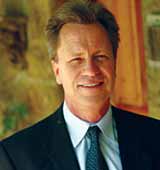|
Executive Interviews: Interview with John A Davis on Family Businesses
May 2007
-
By Dr. Nagendra V Chowdary
 John A Davis
John A Davis Senior Lecturer of Business Administration at Harvard Business School, the Faculty chair for Harvard Business School`s Executive Education Program 
How should the necessary skills
be nurtured and developed amongst
the next generation family members?
Do you suggest a formal training
(let's say by registering in a
course that you teach at HBS) or do
you advocate on-the-job training? Or
a combination?
The next generation needs to be
challenged, encouraged and disciplined
to make sure they are prepared
for business leadership. This
process starts with having challenging
requirements to be hired by the
company and only selecting family
members who meet these requirements.
Usually, it pays to insist on
three or more years of outside employment
for family members.
|
|
Then, family members need to be
given real jobs, with real standards
of performance, rich performance
feedback and consequences for
their performance. Additional formal
education, in today's business
environment, also should be part of
the mix. Succession planning is one of the
most daunting tasks of a CEO of a
well-managed company. Just the
way it happens in a typical listed
company, there might be too many
contenders for the top job in familyrun
business too? How should, the
head of a family-run business in
such situation, manage the transition?
What, according to you,
should be the guiding principles for
managing the transition without
disturbing the business fortunes?
Are there any best practices that
your research highlights?
Succession in family companies has
been well studied and has produced
sensible advice on how to manage
the transition between generations. I
can't do justice to this work in a
short answer but I can give a few
pointers. First, the current leader
needs to lead the process of succession,
making sure it happens and on
time. Otherwise, others are too wary
to raise the subject directly. Second,
trusted outside advisors who are respected
by the current leader often
are pivotal in choosing the right successor,
and making sure that business
leadership transitions effectively.
Third, ownership control
(not necessarily the financial benefits
of ownership) needs to be
passed within five years of the management
transition, and only to
those in the next generation who
support the business and can get
along as owners. What are the critical success factors
for managing a family-run business? What should be the key result
areas for the CEOs of such companies?
I'm sorry but this is much too broad
a question to answer. What are your current
research interests in family-run
businesses?
I am completing a book on the practices
of successful family business
dynasties and another on family
business governance. I am also investigating
how wealth needs to be
managed to keep a family successful.
There are always too many interesting
questions and too little
time. Is there any relationship (may be
a correlation) between entrepreneurship
and family businesses?
I'm sorry but I don't understand this
question. What's your advice to all those
young and to-be-launched familyrun
business aspirants?
Understanding the mission of your
family and taking care of it is as important
as understanding the mission
of your business and building
it.
1.
Family Owned Business Case Study
2. ICMR
Case Collection
3.
Case Study Volumes
|
The Interview was conducted by Dr. Nagendra V Chowdary, Consulting Editor, Effective
Executive and Dean, IBSCDC, Hyderabad. This Interview was originally published in Effective Executive, IUP, May 2007. Copyright © May 2007, IBSCDC
No part of this publication may be copied, reproduced or distributed, stored in a retrieval
system, used in a spreadsheet, or transmitted in any form or medium electronic,
mechanical, photocopying, recording, or otherwise without the permission of IBSCDC. |
